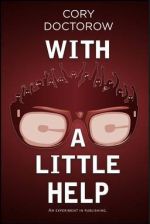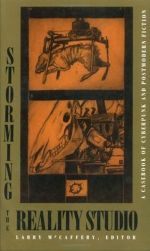The Future Imperfect
The problem with disability in science fiction isn’t much different from the problem of disability in general or literary fiction: it appears as a plot device, or is mean to establish a character or group of characters at radically other, or is the embodiment of our careless attitude toward the ecosystems which support us. We mutate into either superheroes or arch-villains. Darth Vader is an evil torso in what can best be described as a suit-shaped life support system; his disability symbolic of the way in which his defection to the dark side of the force has warped his intellect. In the original Star Trek series, Captain Christopher Pike exists in a metal box less technically sophisticated than the equipment used to film the show until, after being acquitted in a trial for attempting to flee to a planet that could accommodate his disability, his innocence is rewarded and Star Fleet Command makes an exception to the rule to allow him—for his heroism—to live there as if he were again fully able-bodied. In cyberpunk and dark future novels, mutants arise from ecological chaos to either save or destroy mankind. Bodily difference can signal heroism or great evil, but it always signifies in scifi.
This is not the sort of future disability advocates envision. No, we see a future without stairs. A world in which people no longer build doorways too small for a power chair to pass through and every raised threshold also has a ramp. One in which all public meetings and performances have a sign language interpreter available and restaurants have large print and Braille menus on hand. We envision a future in which disability—like race, gender, ethnicity, and other identity axes—may inform, but certainly not define, who a person is.
Disability is created by the ways in which we live. I couldn’t carry two five gallon buckets of water from a communal well to my house a few miles away or easily climb the steps of Machu Picchu in the thin air of the Andes. Because I am a privileged, twenty-first century American woman, this does not make me disabled, but if I were living another life, it could. I am able-bodied because the place where I live already accommodates the ways in which my body does not function optimally. What would a world look like that accommodated all kinds of bodies, all ways of communicating, every way of being an embodied human? How will the need to accommodate alien bodies influence how we accommodate our own? How will science help us build fully inclusive communities?
There is too little science fiction written that envisions a fully accessible, universally designed future. And so we are asking you, gentle readers, to do just that. We’re announcing the first contest to be sponsored by Redstone Science Fiction!
Editor’s Note: We will accept separate submissions that incorporate the values considered in The Future Imperfect. The submissions should portray disability as a simple fact, not as something to be overcome or something to explain why a character is evil. Portrayal of disability in a world where universal access is a shared cultural value is something we’d like to see. What does a world, or space station, or whatever look like when it has been designed to be accessible to everyone and how would people live together there? The story chosen by Sarah Einstein and our editors will be paid a professional rate and will be published in our September issue. The specifics are on our Contest page.
Sarah Einstein writes primarily Creative Nonfiction, though whenever she gets to choose what she reads, she almost always chooses Science Fiction. Her work has appeared in Whitefish Review, Fringe Magazine, Ninth Letter, and she has an upcoming piece in Pank. She has been awarded a Pushcart Prize. She is a dedicated human rights activist and dreams of a future in which all sentient beings are treated with dignity and equal rights.
Navigate: Page 1 Page 2
























35 comments
So many of the characters in Heinlein’s works had disabilities that future science made almost as irrelevant as freckles. I have some faith that our future science will operate in the manner Heinlein envisioned. Where my faith fails me is in my ability to forsee a world as accepting as those he constructed. Science has not built an artificial device that corrects intolerance, indifference or bigotry. Maybe we need pacemakers for the soul.
[…] The Future Imperfect by Sarah […]
[…] 8, 2010 Sarah Einstein writes Disability is created by the ways in which we live. I couldn’t carry two five gallon buckets of […]
It’s sadly rare to find someone who shares my opinion of the Ship books. Too often the disability aspects and slavery are overlooked for the ‘this is cool’ factor. And ‘this is cool’ is something to beware of in responding to Sarah’s idea. As disabled people we don’t just need cool technology to be equal, we need a true change in the way that people regard disability.
As a disability activist I talk about ‘models’ a lot, where a model is the way that someone responds to impairment. Doctors tend to see us as broken, something to be fixed, often without regard to what we really want, that’s the Medical Model. The public mostly see us through the Personal Tragedy Model, which pities and demeans us as the able man’s burden. For many of us the model we chose is the Social Model, which defines disability as the discrimination we experience as the result of our impairment, whether that discrimination be the absence of an access ramp, or someone patting us on the head while prattling about how brave we are.
But even in a utopia fully enabled by the principles of the Social Model, disability will still have an impact. Being disabled takes time and saps energy, for many of us fatigue and pain are the major disabling impacts of our impairment. An accessible world may still be one beyond our ability to access.
This is fascinating. If the world is totally accessible, does disability even exist? Personally, i don’t feel disabled until my lift breaks down, etc.
Are multiple submissions allowed?
The concept is flawed because in an “accessible world” access would even be a consideration. Access exists as an issue because people who have impairments are “other” – their non-comformity being the lack of ‘normality’ and their exploitative value. The discrimination isn’t the result of our impairments, it is the result of how a given society relates to those with impairments. Under these conditions, what events – political, social and economic – would need to take place to transform a disablist world into an inclusive one? Remember ‘disability’ within the social model refers to oppressive social relations within the structures, systems and cultures of specific societies.
Bob,
I’m not sure where we are disconnecting, because I whole-heartedly agree with you. The challenge is not to write a story in which ableism has magically become kittens and rainbows. It is to imagine that this single dimension of compulsory able-bodiness has been addressed. We talk about wanting U.D.–so, okay, what if we got it? Science Fiction let’s us dream of new ways of living and then examine those dreams for their many possible outcomes.
I’m surprised no one’s mentioned Lois McMaster Bujold as an example.
Let me see if I understand: You’re looking for a story in which the Who, What, Where and How seem perfectly ordinary to the characters, disabled and non, but in the back of the reader’s brain something will say “This couldn’t happen Here and Now, because of the meanings disability has in our world.”
Is that it?
I am afraid I make things more confusing when I try to claify them! The call, which was written by the editors, explains it far better than I can. I feel strongly that any more direction would rob us of the chance to see brilliant and surprising work.
I don’t think it is about us “disconnecting”, Sarah. The issue is mindset – not as individuals but as societies. Accessibility surely is about what needs to be – the steps required to be inclusive, accepting and dynamic. If the social environment became inclusive and accepting, then I would argue “access” would cease to be an issue because disability as opposed to impairment would not be socially tolerated – a reverse of the current socio-political discourse.
There are cultural issues around impairment/disability e.g. in the UK, impairment is the body’s state of being and disability is the experience of negative social interactions.
I’m with Melissa Mead; Lois McMaster Bujold has to come into this conversation _somehow_, at least with regard to her characters Miles Naismith Vorkosigan and Mark Pierre Vorkosigan. Granted, they take their disabilities/limitations in stride but their society doesn’t — the interplay/juxtaposition of these things helps drives the stories “Komarr,” “Mirror Dance,” “A Civil Campaign,” “The Vor Game,” and most especially “The Warrior’s Apprentice.” But they do not let their limitations stop them in any way, shape or form.
If you’re looking for more than that — and it sounds like you are — I’m not sure in what way that could be handled.
And “Falling Free.”
(Can you tell I’m a LMMB fan? ;))
Same here. And Eric Flint. And KD Wentworth. “The Course of Empire” was excellent, and “The Crucible of Empire” was nearly as good.
I’ve read 1632, but not those. I’ll have to check them out. Thanks for the mention!
I’ll note that in the ‘brains’ in the ‘Ship who sang’ aren’t merely disabled but require at least some life support equipment to survive and today when a baby is born which will need to be connected to life support equipment for the rest of it’s life to survive it is often not connected. This is not (legally speaking) euthanasia but the end result is the same, so the situation in Mccafrey’s books is already better than it is in real life.
Unicorn,
I’d be interested on your take on these issues as they are problematized in The Ship Who Searched. The young woman in question is older, is being saved only from paralysis and not death, and there is a “twist” at the end which, I think, changes everything. In order to avoid a spoiler, I’ll just ask if you have read this to the end and discovered the “new option” for brainships, and if so, how do you feel about the fact that this option would only be available to those shell people who made a lot of money and earned it?
This is what I love about scifi… it lets us consider ethical and social questions in the abstract and without the constraints of what we really “can” or “can’t” do.
I believe I’ve read all the books in the ‘Brainship’ series. As to how I feel about the new option only being available to those with a lot of money – about the same way I feel about how in real life there are a bunch of very expensive, not covered by insurance treatments that can save lives, or help thousands live something closer to normal. In ‘The ship who searched’ the option was just invented, the heroine was in fact the test case which proved it could actually work, and at that point cost more than most people make in their life and while it’s unfortunate if the choice is solve one person’s quality of life issue, or save 100 lives then in my opinion the correct answer is to tell that person ‘sorry, you’ll have to find the money for this on your own’. (Note that’s quality of life vs. life. If it’s life vs. life the question becomes a lot more stickier because to quote Heinlein “Lives are not integers, they’re infinities”)
If you want a problematic issue in the ‘ship who searched’ is that the shellperson project is the only place where they can fit a person with direct neural hookups because while being confined to a wheelchair with life support systems would be incredibly unpleasant to say the least, being able to control the wheel chair and the robotic arms it had in the book with a thought would go far to make it more bearable – and that, unlike the option revealsed at the end is something that could have and should have been offered to the heroine, and anyone else in a similar situation, even if they did not have the special whatever that allowed the Heroine to become a shell person as old as she was.
One more thing – trying to fit the rules mentioned in any two of the Brainship books into a single framework is IMO impossible.
[…] This essay by Sarah Einstein discusses the use of disability in science fiction. She writes that disability in science fiction is almost always used as a metaphor, symbolic of something about the character or their circumstances. As she writes, “This is not the sort of future disability advocates envision […] We envision a future in which disability—like race, gender, ethnicity, and other identity axes—may inform, but certainly not define, who a person is.” […]